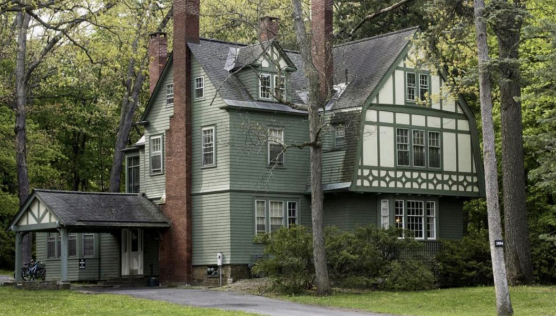Ozone House hosts discussion on climate change denial

Ozone House is Union College’ sustainable campus living theme house. Ozone House promotes environmental awareness while serving as an example of sustainable living. Residents work together to create a sustainable and fun atmosphere. The house founded the Ozone Café, and members work closely with various campus departments to offer sustainable options for Union.
May 5, 2022
On Thursday, April 28, Mia Villeneuve ‘24 presented their project titled “Climate Change Denial and Conspiracy Theories” at Ozone House to an audience of around twelve people. Villeneuve worked with psychology Professor Joshua Hart for their sophomore research project on conspiracy theories, and focused on climate change denial for this project. The presentation at Ozone House was an expansion of that earlier work. The presentation concluded with a roundtable talk with other students on the issues that lead to distrust of climate science.
Villeneuve began the presentation distinguishing the difference between misinformation and disinformation, and what it means in terms of the climate change movement. They then described the four categories of climate change denial: trend denial, attribution denial, impact denial, and consensus denial. Villeneuve discussed the demographics of people who were statistically most likely to deny climate change (conservative white men), and how the polarization among political parties nowadays impacts the spread of scientific knowledge and misinformation. They then discussed why the ideas of climate change denial spread, citing biased risk assessment, motivated cognition, the presence of echo chambers, and the role of conspiracy theories and confirmation bias among groups of climate change deniers. They concluded their presentation by discussing what we could do about climate change denial, stressing the importance of avoiding the backlash effect, and how to provide trustworthy sources. They stated that education before misinformation was crucial, and how it was necessary to teach people how to determine if a source is credible or not.
After their talk, Villeneuve led a roundtable discussion with the attendees. discussed climate change denial as a group, focusing on how to communicate scientific knowledge to the public, and how to make it more accessible, and what we can do as individuals to slow down climate change as a whole. Part of the roundtable discussion was about the role of colleges in combating misinformation by educating people before they are taught misinformation, a task difficult for private higher education, but a goal that Union College can achieve through programs like COCOA House. It also highlighted the need for publicly trusted, reliable and free sources of academic research.






